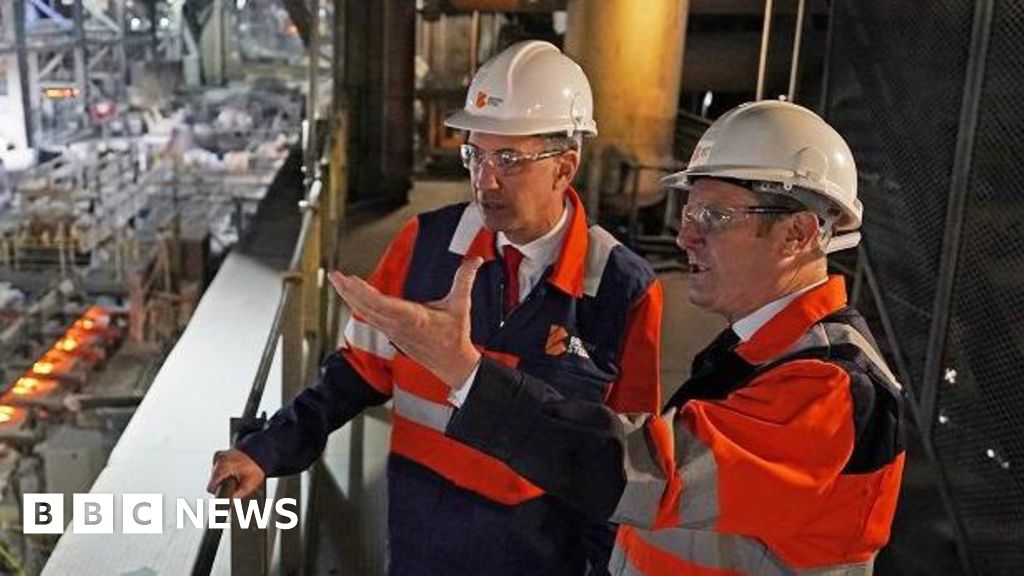Labour’s green policies are costing jobs and “hollowing out working class communities,” the leader of the GMB union has warned.
Gary Smith told the BBC the government had to stop “decarbonisation through deindustrialisation” and called for an “honest debate” about the government’s plans for British industry.
While the unions have welcomed Keir Starmer’s new government, at the TUC conference in Brighton tensions between the political and industrial wings of the labour movement were transparent.
The loss of jobs at Port Talbot steel works has highlighted wider concerns from some unions – in particular the GMB and Unite, two of the country’s largest – about Labour’s environmental policy, and the journey to net zero.
The unions softened the blow in South Wales by arguing for improved redundancy terms and retraining for workers facing the loss of their jobs – an argument accepted by Tata Steel.
An environmentally-friendly “electric arc” furnace at Port Talbot is to be built and government funding guaranteed so steelmaking will not be put on the scrapheap.
Nonetheless, the second traditional coke-fuelled furnace will be closed soon and the company is in the process of shedding around 2,500 of the 4,000 jobs.
Gary Smith told the BBC: “This was a mess created under the Tories…but let’s be under no illusions.
“Thousands of jobs are going to go, a community is going to be hollowed out. We’re going to see huge reductions in our carbon emissions, but at what price?’
And his concerns are not limited to the community in South Wales.
He fears for the future of more of British manufacturing – including shipbuilding in Belfast, and the sole oil refinery in Scotland at Grangemouth.
Business secretary Jonathan Reynolds promised a steel strategy – and £2.5bn to help secure its future, a key demand of unions such as Unite, Community and the GMB.
But unions are concerned that not every plant will have a future.
The government’s steel strategy is scheduled for next Spring but there is increasing anxiety that Chinese-owned British Steel in Scunthorpe will not survive the winter.
Some 2,500 jobs are under threat and, with them, the ability to produce steel from scratch, rather than from scrap metal.
Newport MP Jessica Morden raised the risks of “deindustrialisation” at Prime Minister’s Questions and asked Sir Keir Starmer what was being done to safeguard jobs and communities.
He sounded reassuring: “We need steel made in this country and our plans and our missions mean we’ll need more steel not less. It’s the duty of the government to ensure communities aren’t ignored in the (green) transition.”
Labour is also promising a wider industrial strategy, but the GMB and some other unions are worried that this and the transition to green energy are not – at least, yet – joined up.
Gary Smith told me: “We’re not reducing our consumption of oil and gas, we’ll still need lots of steel, we’ll just be producing this stuff elsewhere and importing it.
“We’re going to be producing more steel from countries like China who burn coal to produce it. This is bad for communities, not great for national security and it makes no sense in terms of the environment.”
He is now calling for a debate on how the government intends to manage the transition to net zero – the flagship policy of Energy Security and Net Zero Secretary Ed Miliband.
“We’re going to have to have an honest conversation about the way in which environmental policy is impacting jobs.
“Our message to Ed Miliband is very clear: We are worried about a lot of promises that are not being delivered on jobs.”
Those worries are shared by the Unite union when it comes to employment in the oil and gas industries.
Both unions – who don’t always see eye-to-eye – joined forces successfully to push a motion through the TUC conference opposing the ending of new North Sea licences unless and until guarantees are delivered on jobs.
I’m told talks with ministers will continue behind closed doors.
Unite leader Sharon Graham has publicly set out her red lines.
She said: “Right now there is talk of a ‘just transition’ but in reality 30,000 workers in the North sea are on a jobs cliff edge.
“Labour’s plans are lacking in cast iron guarantees.”
And in a reference to the coal mine closures of the 1980s, she added: “Make no mistake – Unite will not stand by and watch those workers becoming the miners of our generation.”
There were other differences on display this week between unions and government.
The TUC opposed the withdrawal of winter fuel payments and called for the two child benefit limit in the welfare system to be lifted.
The conference also passed a motion calling for “arbitary” fiscal rules governing debt and borrowing to be relaxed.
On these issues the government, bluntly, is unlikely to listen.
But when it comes to members’ jobs some of the big unions hope they can have more influence.
The GMB and Unite say they made the Port Talbot deal less damaging.
But they could not convince Tata to keep its two blast furnaces open until the new electric furnace is built.
They know they face an uphill battle to prevent job losses in traditional industries before the promised green jobs become available.
The government and trade unions want to reach net zero. but both the energy security and net zero secretary, and the business secretary, will continue to be warned by some of the biggest unions the journey to that destination could come with economic and political costs.

